#here's the full article
Explore tagged Tumblr posts
Text
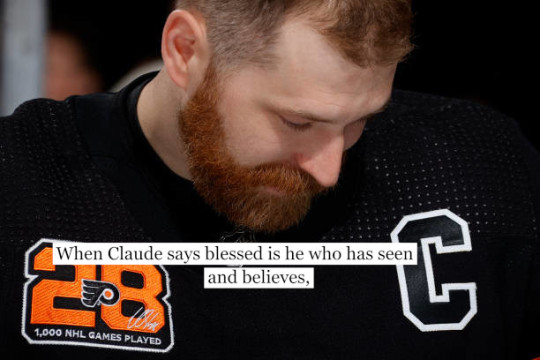
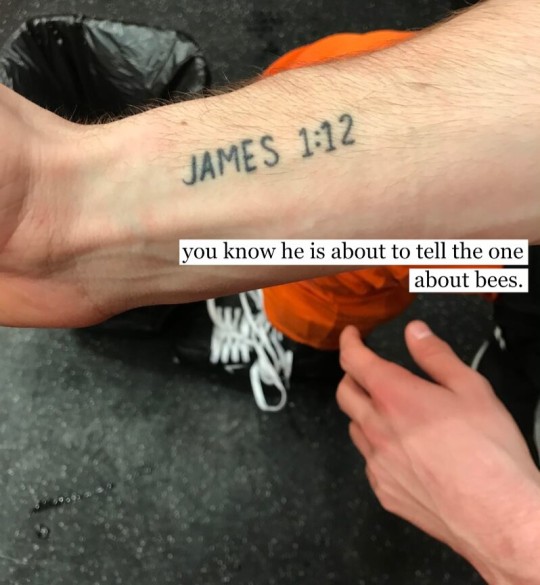
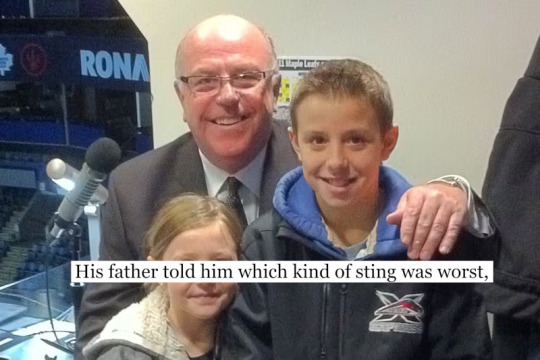
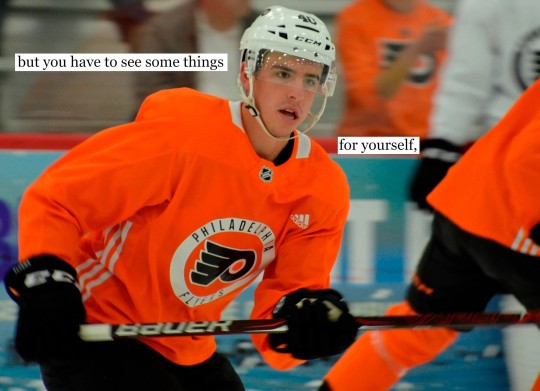
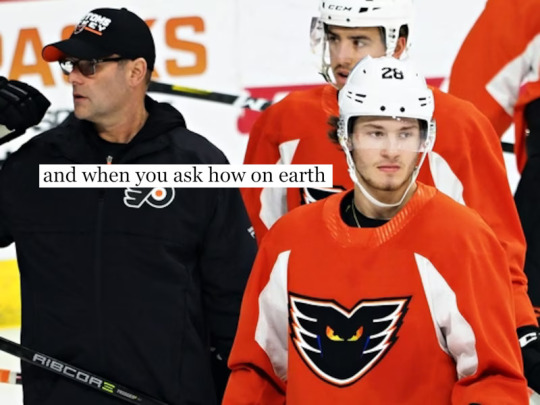
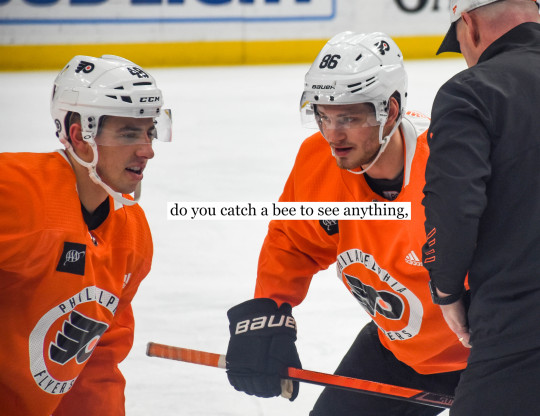
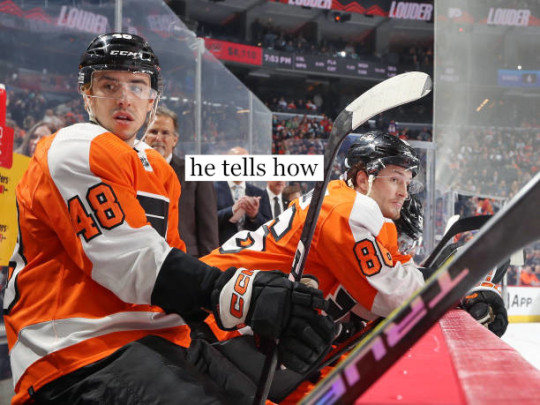
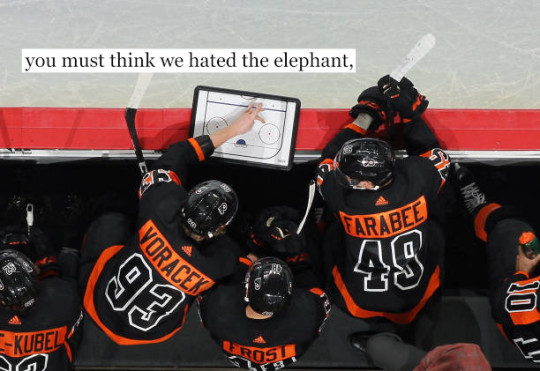
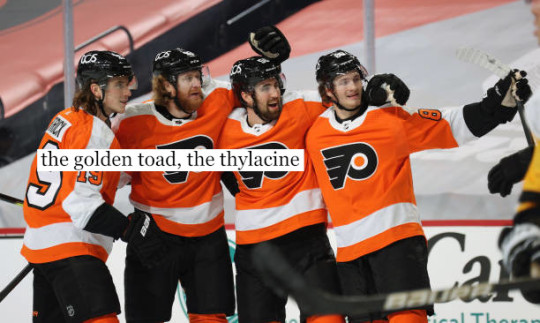
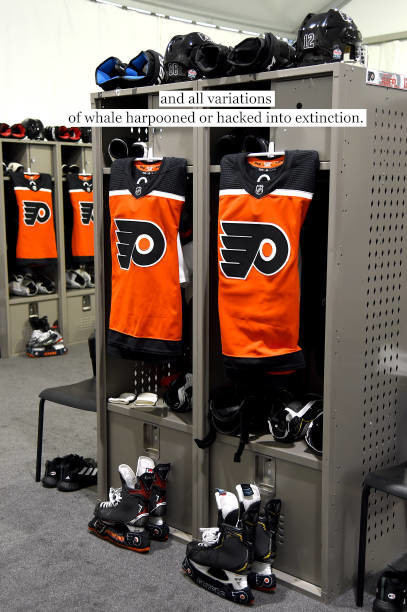
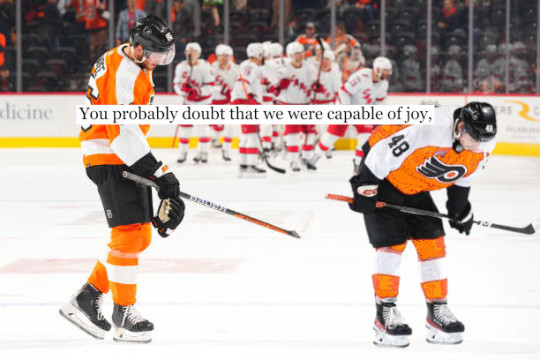
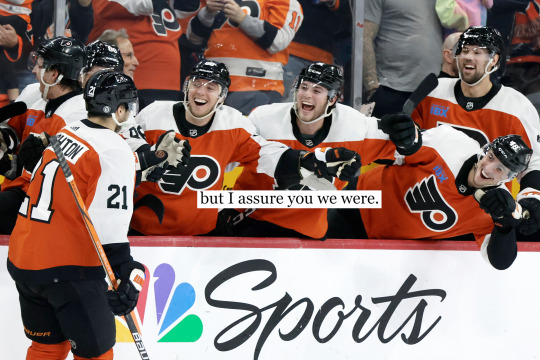
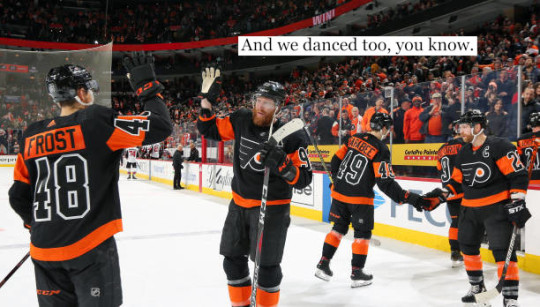


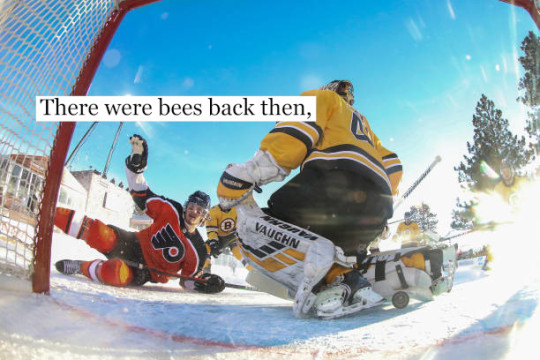

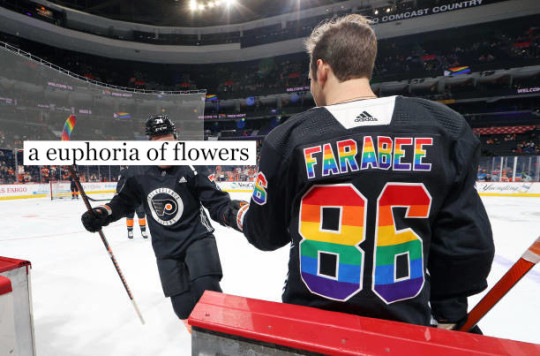

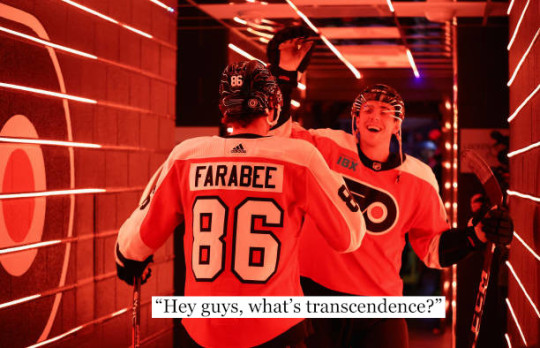
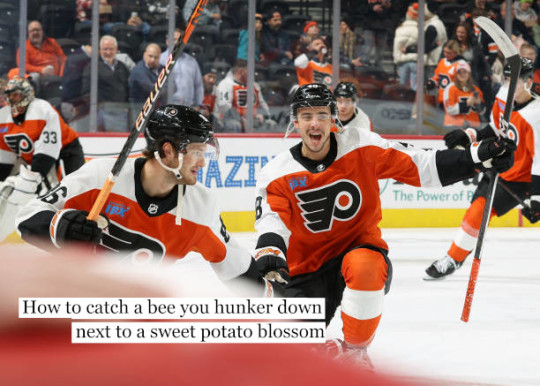
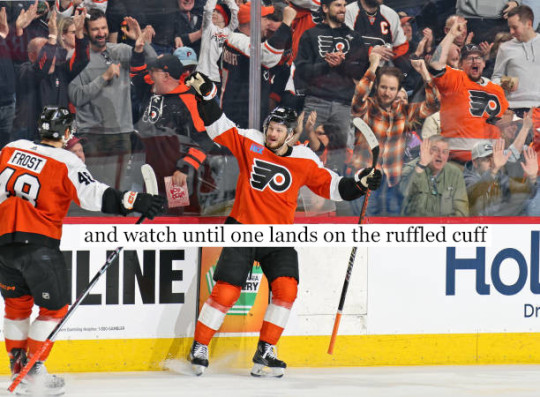
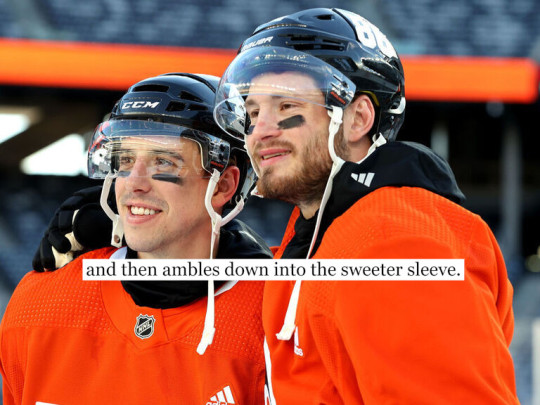

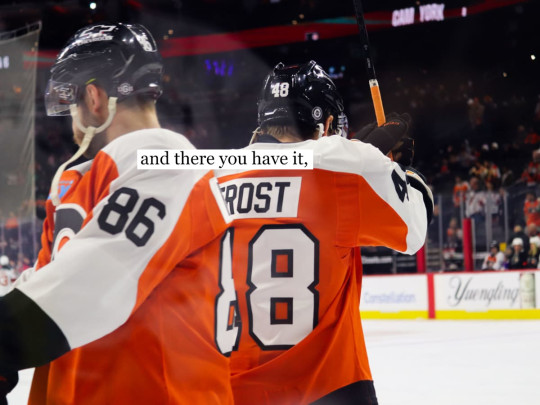
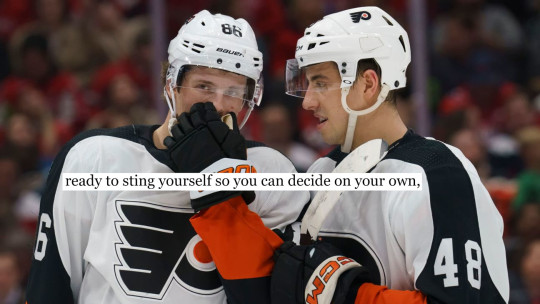
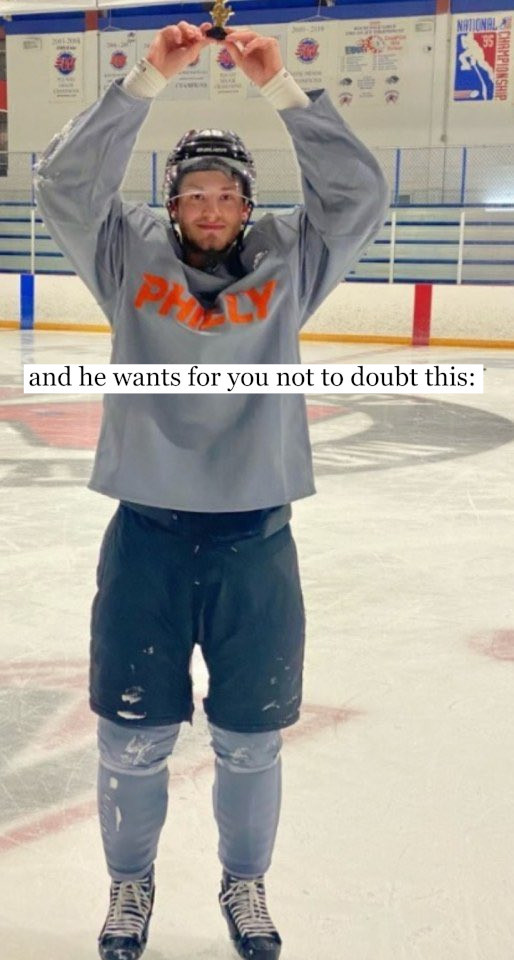
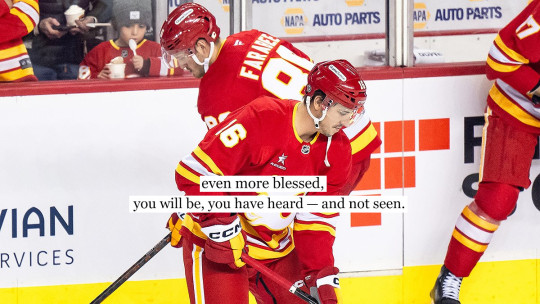
blessed be (lorscher bienensegen) | telling the bees (wiþ ymbe)
"Bees" [remixed, abridged], Claudia Emerson // "Letter to Someone Living Fifty Years from Now" [remixed. abridged], Matthew Olzmann // "Letter to my Great, Great Grandchild" [remixed, abridged], J.P. Grasser | Len Redkole, Nina Weiss, Brian Babineau, Christian Peterson, Mitchell Leff, Dave Isaac, Megan DeRuchie
#liv in the replies#if i were insane there would be an appendix to this called telling the bees however i finished this at 3am yesterday its nearly midnight &#my cutoff is when my ahl asg stream cuts. GOD by now i should know when i save a poem like hmm. not applicable but god it'd be perfect#THAT'S A CURSE. DON'T PUT IT IN THE DOCUMENT. DON'T SAVE IT. FORGET YOU READ IT. IT'S A CURSE!! <- things i should've told myself when i#went to read bees was already like 👀 &then the first line was FUCKING CLAUDE!!!!! anyway. sorry also this is like. insanely long but ALSO#regarding mf claude. the first picture is a leftover from the claude edit i made years ago so that feels GREAT and BEAUTIFUL & also for me#as ever y'all will be getting a full breakdown. starting with what i regularly have a breakdown about every time i see it which is joelle's#james 1:12 tattoo which if u use the king james version (gay) is blessed is he who perseveres under trial because having stood the test he#will receive the crown of life the lord has promised to those who love him. which i always go blessed is he who perseveres // for those who#love him. and that's joel. ignoring him getting it then getting sent down on his birthday IGNORING IT. also we know the frosty/maple leafs#hahaha fuck the flyers lore right? good. that's morgan and his dad also bc i love a baby picture & it was perfect. also the dave isaac pic#next was in an article talking about morgan 'stung' by draft camp. shut UP. i have an alt for tells him with claude and ALSO hate the#elephant w/phil bc myesie u fuckin leaf-eater (giraffe) but i love the composition of that jake shot & had to use it (it was also almost#tells him) with thylacine jakey frog nolan also raff the extinct whale bc i needed him here. if my editing on incapable of joy is bad no on#tell me i did some SHENANIGANS to put morgan in there & color-pick/alter his jersey. new skill. i think euphoria is one of my favorite for#the sake of pride night but ALSO that polaroid kills me very time &they're so stoners contemplate the universe but ALSO i love transcendenc#so that whole three photo string i think is my favorite. and i was in looking at these like listen okay it's okay there are only so many#photos in the world. you can repeat from others you've seen before. except ALSO there's so many of these freaks together do you separate#and every time i was like there can't be more there was more. don't ask the number of back-ups for the sweetest blossom/pinch/ruffle sets#okay also the ready to be stung one was a surprise favorite fit for me because i love that line but wasn't sure how to convey it? so it's o#i think with how morgan's face is and the almost of it all. yes joel hardest trier is in there purely for me i do have an alt but. how coul#u doubt him. insert sasha's tweet abt how much joel loves philly but all his quotes have been abt being excited for morgan to have a fresh#start. AND NOT EVEN TWO MINUTES IN CALGARY AND YOU'RE STILL INSEPARABLE god i literally googled frost farabee calgary to find the last#blessed [because. heard but not seen you know of everyone traded but you went together. not seen. (which ties into the terrible appendix)]#and IT DIDN'T EVEN TAKE ME TWO MINUTES TO FIND THAT!!! WHAT DO YOU MEANNN anyway. sorry again it's so long & also i will be vanishing a wee#& a half after posting [redacted] is kicking my ass & im doing [redacted fun things WAIT ACTUALLY U CAN KNOW ONE i'm seeing hippo campus]#morgan frost#joel farabee#philadelphia flyers#calgary flames
70 notes
·
View notes
Text



“Edwin and Charles have died, but in a lot of ways they’ve never had to face that they’re dead,” creator Steve Yockey explains of the show’s ghostly duo. “And here comes this living teenage girl [Crystal] that upsets the applecart. All of a sudden everyone’s having to learn how to grieve for these experiences that happened a long time ago or face things about their lives they’ve put behind them but never really processed.”
#dead boy detectives#jayden revri#kassius nelson#yuyu kitamura#george rexstrew#steve yockey#beth schwartz#dbda articles#going to start working on getting articles up on here now too#posting a few clips so people will go and read the full thing
155 notes
·
View notes
Text
In 2006, the year Taylor Swift released her first single, a closeted country singer named Chely Wright, then 35, held a 9-millimeter pistol to her mouth. Queer identity was still taboo enough in mainstream America that speaking about her love for another woman would have spelled the end of a country music career. But in suppressing her identity, Ms. Wright had risked her life.
In 2010, she came out to the public, releasing a confessional memoir, “Like Me,” in which she wrote that country music was characterized by culturally enforced closeting, where queer stars would be seen as unworthy of investment unless they lied about their lives. “Country music,” she wrote, “is like the military — don’t ask, don’t tell.”
The culture in which Ms. Wright picked up that gun — the same one in which Ms. Swift first became a star — was stunningly different from today’s. It’s dizzying to think about the strides that have been made in Americans’ acceptance of the L.G.B.T.Q. community over the past decade: marriage equality, queer themes dominating teen entertainment, anti-discrimination laws in housing and, for now, in the workplace. But in recent years, a steady drip of now-out stars — Cara Delevingne, Colton Haynes, Elliot Page, Kristen Stewart, Raven-Symoné and Sam Smith among them — have disclosed that they had been encouraged to suppress their queerness in order to market projects or remain bankable.
The culture of country music hasn’t changed so much that homophobia is gone. Just this past summer, Adam Mac, an openly gay country artist, was shamed out of playing at a festival in his hometown because of his sexual orientation. In September, the singer Maren Morris stepped away from country music; she said she did so in part because of the industry’s lingering anti-queerness. If country music hasn’t changed enough, what’s to say that the larger entertainment industry — and, by extension, our broader culture — has?
Periodically, I return to a video, recorded by a shaky hand more than a decade ago, of Ms. Wright answering questions at a Borders bookstore about her coming out. She likens closeted stardom to a blender, an “insane” and “inhumane” heteronormative machine in which queer artists are chewed to bits.
“It’s going to keep going,” Ms. Wright says, “until someone who has something to lose stands up and just says ‘I’m gay.’ Somebody big.” She continues: “We need our heroes.”
What if someone had already tried, at least once, to change the culture by becoming such a hero? What if, because our culture had yet to come to terms with homophobia, it wasn’t ready for her?
What if that hero’s name was Taylor Alison Swift?
In the world of Taylor Swift, the start of a new “era” means the release of new art (an album and the paratexts — music videos, promotional ephemera, narratives — that supplement it) and a wholesale remaking of the aesthetics that will accompany its promotion, release and memorializing. In recent years, Ms. Swift has dominated pop culture to such a degree that these transformations often end up altering American culture in the process.
In 2019, she was set to release a new album, “Lover,” the first since she left Big Machine Records, her old Nashville-based label, which she has since said limited her creative freedom. The aesthetic of what would be known as the “Lover Era” emerged as rainbows, butterflies and pastel shades of blue, purple and pink, colors that subtly evoke the bisexual pride flag.
On April 26, Lesbian Visibility Day, Ms. Swift released the album’s lead single, “ME!,” in which she sings about self-love and self-acceptance. She co-directed a campy music video to accompany it, which she would later describe as depicting “everything that makes me, me.” It features Ms. Swift dancing at a pride parade, dripping in rainbow paint and turning down a man’s marriage proposal in exchange for a … pussy cat.
At the end of June, the L.G.B.T.Q. community would celebrate the 50th anniversary of the Stonewall Riots. On June 14, Ms. Swift released the video for her attempt at a pride anthem, “You Need to Calm Down,” in which she and an army of queer celebrities from across generations — the “Queer Eye” hosts, Ellen DeGeneres, Billy Porter, Hayley Kiyoko, to name a few — resist homophobia by living openly. Ms. Swift sings that outrage against queer visibility is a waste of time and energy: “Why are you mad, when you could be GLAAD?”
The video ends with a plea: “Let’s show our pride by demanding that, on a national level, our laws truly treat all of our citizens equally.” Many, in the press and otherwise, saw the video as, at best, a misguided attempt at allyship and, at worst, a straight woman co-opting queer aesthetics and narratives to promote a commercial product.
Then, Ms. Swift performed “Shake It Off” as a surprise for patrons at the Stonewall Inn. Rumors — that were, perhaps, little more than fantasies — swirled in the queerer corners of her fandom, stoked by a suggestive post by the fashion designer Christian Siriano. Would Ms. Swift attend New York City’s WorldPride march on June 30? Would she wear a dress spun from a rainbow? Would she give a speech? If she did, what would she declare about herself?
The Sunday of the march, those fantasies stopped. She announced that the music executive Scooter Braun, who she described as an “incessant, manipulative” bully, had purchased her masters, the lucrative original recordings of her work.
Ms. Swift’s “Lover” was the first record that she created with nearly unchecked creative freedom. Lacking her old label’s constraints, she specifically chose to feature activism for and the aesthetics of the L.G.B.T.Q. community in her confessional, self-expressive art. Even before the sale of her masters, she appeared to be stepping into a new identity — not just an aesthetic — that was distinct from that associated with her past six albums.
When looking back on the artifacts of the months before that album’s release, any close reader of Ms. Swift has a choice. We can consider the album’s aesthetics and activism as performative allyship, as they were largely considered to be at the time. Or we can ask a question, knowing full well that we may never learn the answer: What if the “Lover Era” was merely Ms. Swift’s attempt to douse her work — and herself — in rainbows, as so many baby queers feel compelled to do as they come out to the world?
There’s no way of knowing what could have happened if Ms. Swift’s masters hadn’t been sold. All we know is what happened next. In early August, Ms. Swift posted a rainbow-glazed photo of a series of friendship bracelets, one of which says “PROUD” with beads in the color of the bisexual pride flag. Queer people recognize that this word, deployed this way, typically means that someone is proud of their own identity. But the public did not widely view this as Ms. Swift’s coming out.
Then, Vogue released an interview with Ms. Swift that had been conducted in early June. When discussing her motivations for releasing “You Need to Calm Down,” Ms. Swift said, “Rights are being stripped from basically everyone who isn’t a straight white cisgender male.” She continued: “I didn’t realize until recently that I could advocate for a community that I’m not a part of.” That statement suggests that Ms. Swift did not, in early June, consider herself part of the L.G.B.T.Q. community; it does not illuminate whether that is because she was a straight, cis ally or because she was stuck in the shadowy, solitary recesses of the closet.
On Aug. 22, Ms. Swift publicly committed herself to the as-of-then-unproven project of rerecording and rereleasing her first six albums. The next day, she finally released “Lover,” which raises more questions than it answers. Why does she have to keep secrets just to keep her muse, as all her fans still sing-scream on “Cruel Summer”? About what are the “hundred thrown-out speeches I almost said to you,” in her chronicle of self-doubt, “The Archer,” if not her identity? And what could the album’s closing words, which come at the conclusion of “Daylight,” a song about stepping out of a 20-year darkness and choosing to “let it go,” possibly signal?
I want to be defined by the things that I love,
Not the things I hate,
Not the things that I’m afraid of, I’m afraid of,
Not the things that haunt me in the middle of the night,
I just think that,
You are what you love.
The first time I viewed “Lover” through the prism of queerness, I felt delirious, almost insane. I kept wondering whether what I was perceiving in her work was truly there or if it was merely a mirage, born of earnest projection.
My longtime reading of Ms. Swift’s celebrity — like that of a majority of her fan base — had been stuck in the lingering assumptions left by a period that began more than a decade and a half ago, when a girl with an overexaggerated twang, Shirley Temple curls and Georgia stars in her eyes became famous. Then, she presented as all that was to be expected of a young starlet: attractive yet virginal, knowing yet naïve, not talented enough to be formidable, not commanding enough to be threatening, confessional, eager to please. Her songs earnestly depicted the fantasies of a girl raised in a traditional culture: high school crushes and backwoods drives, princelings and wedding rings, declarations of love that climax only in a kiss — ideally in the pouring rain.
When Ms. Swift was trying to sell albums in that late-2000s media environment, her songwriting didn’t match the image of a sex object, the usual role reserved for female celebrities in our culture. Instead, the story the public told about her was that she laundered her affection to a litter of promising grown men, in exchange for songwriting inspiration. A young Ms. Swift contributed to this narrative by hiding easy-to-decode clues in liner notes that suggested a certain someone was her songs’ inspiration (“SAM SAM SAM SAM SAM SAM,” “ADAM,” “TAY”) or calling out an ex-boyfriend on the “Ellen” show and “Saturday Night Live.” Despite the expansive storytelling in Ms. Swift’s early records, her public image often cast a man’s interest as her greatest ambition.
As Ms. Swift’s career progressed, she began to remake that image: changing her style and presentation, leaving country music for pop and moving from Nashville to New York. By 2019, her celebrity no longer reflected traditional culture; it had instead become a girlboss-y mirror for another dominant culture — that of white, cosmopolitan, neoliberal America.
But in every incarnation, the public has largely seen those songs — especially those for which she doesn’t directly state her inspiration — as cantos about her most recent heterosexual love, whether that idea is substantiated by evidence or not. A large portion of her base still relishes debating what might have happened with the gentleman caller who supposedly inspired her latest album. Feverish discussions of her escapades with the latest yassified London Boy or mustachioed Mr. Americana fuel the tabloid press — and, embarrassingly, much of traditional media — that courts fan engagement by relentlessly, unquestioningly chronicling Ms. Swift’s love life.
Even in 2023, public discussion about the romantic entanglements of Ms. Swift, 34, presumes that the right man will “finally” mean the end of her persistent husbandlessness and childlessness. Whatever you make of Ms. Swift’s extracurricular activities involving a certain football star (romance for the ages? strategic brand partnership? performance art for entertainment’s sake?), the public’s obsession with the relationship has been attention-grabbing, if not lucrative, for all parties, while reinforcing a story that America has long loved to tell about Ms. Swift, and by extension, itself.
Because Ms. Swift hasn’t undeniably subverted our culture’s traditional expectations, she has managed, in an increasingly fractured cultural environment, to simultaneously capture two dominant cultures — traditional and cosmopolitan. To maintain the stranglehold she has on pop culture, Ms. Swift must continue to tell a story that those audiences expect to consume; she falls in love with a man or she gets revenge. As a result, her confessional songs languish in a place of presumed stasis; even as their meaning has grown deeper and their craft more intricate, a substantial portion of her audience’s understanding of them remains wedded to the same old narratives.
But if interpretations of Ms. Swift’s art often languish in stasis, so do the millions upon millions of people who love to play with the dollhouse she has constructed for them. Her dominance in pop culture and the success of her business have given her the rare ability to influence not only her industry but also the worldview of a substantial portion of America. How might her industry, our culture and we, ourselves, change if we made space for Ms. Swift to burn that dollhouse to the ground?
Anyone considering the whole of Ms. Swift’s artistry — the way that her brilliantly calculated celebrity mixes with her soul-baring art — can find discrepancies between the story that underpins her celebrity and the one captured by her songs. One such gap can be found in her “Lover” era. Others appear alongside “dropped hairpins,” or the covert ways someone can signal queer identity to those in the know while leaving others comfortable in their ignorance. Ms. Swift dropped hairpins before “Lover” and has continued to do so since.
Sometimes, Ms. Swift communicates through explicit sartorial choices — hair the colors of the bisexual pride flag or a recurring motif of rainbow dresses. She frequently depicts herself as trapped in glass closets or, well, in regular closets. She drops hairpins on tour as well, paying tribute to the Serpentine Dance of the lesbian artist Loie Fuller during the Reputation Tour or referencing “The Ladder,” one of the earliest lesbian publications in the United States, in her Eras Tour visuals.
During the Eras Tour, Ms. Swift traps her past selves — including those from her “Lover” era — in glass closets.
Dropped hairpins also appear in Ms. Swift’s songwriting. Sometimes, the description of a muse — the subject of her song, or to whom she sings — seems to fit only a woman, as it does in “It’s Nice to Have a Friend,” “Maroon” or “Hits Different.” Sometimes she suggests a female muse through unfulfilled rhyme schemes, as she does in “The Very First Night,” when she sings “didn’t read the note on the Polaroid picture / they don’t know how much I miss you” (“her,” instead of that pesky little “you,” would rhyme). Her songwriting also noticeably alludes to poets whose muses the historical record incorrectly cast as men — Emily Dickinson chief among them — as if to suggest the same fate awaits her art. Stunningly, she even explicitly refers to dropping hairpins, not once, but twice, on two separate albums.
In isolation, a single dropped hairpin is perhaps meaningless or accidental, but considered together, they’re the unfurling of a ballerina bun after a long performance. Those dropped hairpins began to appear in Ms. Swift’s artistry long before queer identity was undeniably marketable to mainstream America. They suggest to queer people that she is one of us. They also suggest that her art may be far more complex than the eclipsing nature of her celebrity may allow, even now.
Since at least her “Lover” era, Ms. Swift has explicitly encouraged her fans to read into the coded messages (which she calls “Easter eggs”) she leaves in music videos, social media posts and interviews with traditional media outlets, but a majority of those fans largely ignore or discount the dropped hairpins that might hint at queer identity. For them, acknowledging even the possibility that Ms. Swift could be queer would irrevocably alter the way they connect with her celebrity, the true product they’re consuming.
There is such public devotion to the traditional narrative Ms. Swift embodies because American culture enshrines male power. In her sweeping essay, “Compulsory Heterosexuality and Lesbian Existence,” the lesbian feminist poet Adrienne Rich identified the way that male power cramps, hinders or devalues women’s creativity. All of the sexist undertones with which Ms. Swift’s work can be discussed (often, even, by fans) flow from compulsory heterosexuality, or the way patriarchy draws power from the presumption that women naturally desire men. She must write about men she surely loves or be unbankable; she must marry and bear children or remain a child herself; she must look like, in her words, a “sexy baby” or be undesirable, “a monster on the hill.”
A woman who loves women is most certainly a monster to a society that prizes male power. She can fulfill none of the functions that a traditional culture imagines — wife, mother, maid, mistress, whore — so she has few places in the historical record. The Sapphic possibility of her work is ignored, censored or lost to time. If there is queerness earnestly implied in Ms. Swift’s work, then it’s no wonder that it, like that of so many other artists before her, is so often rendered invisible in the public imagination.
While Ms. Swift’s songs, largely written from her own perspective, cannot always conform to the idea of a woman our culture expects, her celebrity can. That separation, between Swift the songwriter and Swift the star, allows Ms. Swift to press against the golden birdcage in which she has found herself. She can write about women’s complexity in her confessional songs, but if ever she chooses not to publicly comply with the dominant culture’s fantasy, she will remain uncategorizable, and therefore, unsellable.
Her star — as bright as it is now — would surely dim.
Whether she is conscious of it or not, Ms. Swift signals to queer people — in the language we use to communicate with one another — that she has some affinity for queer identity. There are some queer people who would say that through this sort of signaling, she has already come out, at least to us. But what about coming out in a language the rest of the public will understand?
The difference between any person coming out and a celebrity doing so is the difference between a toy mallet and a sledgehammer. It’s reasonable for celebrities to be reticent; by coming out, they potentially invite death threats, a dogged tabloid press that will track their lovers instead of their beards, the excavation of their past lives, a torrent of public criticism and the implosion of their careers. In a culture of compulsory heterosexuality, to stop lying — by omission or otherwise — is to risk everything.
American culture still expects that stars are cis and straight until they confess themselves guilty. So, when our culture imagines a celebrity’s coming out, it expects an Ellen-style announcement that will submerge the past life in phoenix fire and rebirth the celebrity in a new image. In an ideal culture, wearing a bracelet that says “PROUD,” waving a pride flag onstage, placing a rainbow in album artwork or suggestively answering fan questions on Instagram would be enough. But our current reality expects a supernova.
Because of that expectation, stars end up trapped behind glass, which is reinforced by the tabloid press’s subtle social control. That press shapes the public’s expectations of others’ identities, even when those identities are chasms away from reality. Celebrities who master this press environment — Ms. Swift included — can bolster their business, but in doing so, they reinforce a heteronormative culture that obsesses over pregnancy, women’s bodies and their relationships with men.
That environment is at odds with the American movement for L.G.B.T.Q. equality, which still has fights to win — most pressingly, enshrining trans rights and squashing nonsensical culture wars. But lately I’ve heard many of my young queer contemporaries — and the occasional star — wonder whether the movement has come far enough to dispense with the often messy, often uncomfortable process of coming out, over and over again.
That questioning speaks to an earnest conundrum that queer people confront regularly: Do we live in this world, or the world to which we ought to aspire?
Living in aspiration means ignoring the convention of coming out in favor of just … existing. This is easier for those who can pass as cis and straight if need be, those who are so wealthy or white that the burden of hiding falls to others and those who live in accepting urban enclaves. This is a queer life without friction; coming out in a way straight people can see is no longer a prerequisite for acceptance, fulfillment and equality.
This aspiration is tremendous, but in our current culture, it is available only to a privileged few. Should such an inequality of access to aspiration become the accepted state of affairs, it would leave those who can’t hide to face society’s cruelest actors without the backing of a vocal, activated community. So every queer person who takes issue with the idea that we must come out ought to ask a simple question — what do we owe one another?
If coming out is primarily supposed to be an act of self-actualization, to form our own identities, then we owe one another nothing. This posture recognizes that the act of coming out implicitly reinforces straight and cis identities as default, which is not worth the rewards of outness.
But if coming out is supposed to be a radical act of resistance that seeks to change the way our society imagines people to be, then undeniable visibility is essential to make space for those without power. In this posture, queer people who can live in aspiration owe those who cannot a real world in which our expansive views of love and gender aren’t merely tolerated but celebrated. We have no choice but to actively, vocally press against the world we’re in, until no one is stuck in it.
And so just for a little while longer, we need our heroes.
But if queer people spend all of our time holding out for a guiding light, we might forgo a more pressing question that if answered, just might inch all of us a bit closer to aspiration. The next time heroes appear, are we ready to receive them?
It takes neither a genius nor a radical to see queerness implied by Ms. Swift’s work. But figuring out how to talk about it before the star labels herself is another matter. Right now, those who do so must inject our perceptions with caveats and doubt or pretend we cannot see it (a lie!) — implicitly acquiescing to convention’s constraints in the name of solidarity.
Lying is familiar to queer people; we teach ourselves to do it from an early age, shrouding our identities from others, and ourselves. It’s not without good reason. To maintain the safety (and sometimes the comfort) of the closet, we lie to others, and, most crucially, we allow others to believe lies about us, seeing us as something other than ourselves. Lying is doubly familiar to those of us who are women. To reduce friction, so many of us still shrink life to its barest version in the name of honor or safety, rendering our lives incomplete, our minds lobotomized and our identities unexplored.
By maintaining a culture of lying about what we, uniquely, have the knowledge and experience to see, we commit ourselves to a vow of silence. That vow may protect someone’s safety, but when it is applied to works of culture, it stymies our ability to receive art that has the potential to change or disrupt us. As those with queer identity amass the power of commonplaceness, it’s worth questioning whether the purpose of one of the last great taboos that constrains us befits its cost.
In every case, is the best form of solidarity still silence?
I know that discussing the potential of a star’s queerness before a formal declaration of identity feels, to some, too salacious and gossip-fueled to be worthy of discussion. They might point to the viciousness of the discourse around “queerbaiting” (in which I have participated); to the harm caused by the tabloid press’s dalliances with outing; and, most crucially, to the real material sacrifices that queer stars make to come out, again and again, as reasons to stay silent.
I share many of these reservations. But the stories that dominate our collective imagination shape what our culture permits artists and their audiences to say and be. Every time an artist signals queerness and that transmission falls on deaf ears, that signal dies. Recognizing the possibility of queerness — while being conscious of the difference between possibility and certainty — keeps that signal alive.
So, whatever you make of Ms. Swift’s sexual orientation or gender identity (something that is knowable, perhaps, only to her) or the exact identity of her muses (something better left a mystery), choosing to acknowledge the Sapphic possibility of her work has the potential to cut an audience that is too often constrained by history, expectation and capital loose from the burdens of our culture.
To start, consider what Ms. Swift wrote in the liner notes of her 2017 album, “reputation”: “When this album comes out, gossip blogs will scour the lyrics for the men they can attribute to each song, as if the inspiration for music is as simple and basic as a paternity test.”
Listen to her. At the very least, resist the urge to assume that when Ms. Swift calls the object of her affection “you” in a song, she’s talking about a man with whom she’s been photographed. Just that simple choice opens up a world of Swiftian wordplay. She often plays with pronouns, trading “you” and “him” so that only someone looking for a distinction between two characters might find one. Turns of phrase often contain double or even triple meanings. Her work is a feast laid specifically for the close listener.
Choosing to read closely can also train the mind to resist the image of an unmarried woman that compulsory heterosexuality expects. And even if it is only her audience who points at rainbows, reading Ms. Swift’s work as queer is still worthwhile, for it undermines the assumption that queer identity impedes pop superstardom, paving the way for an out artist to have the success Ms. Swift has.
After all, would it truly be better to wait to talk about any of this for 50, 60, 70 years, until Ms. Swift whispers her life story to a biographer? Or for a century or more, when Ms. Swift’s grandniece donates her diaries to some academic library, for scholars to pore over? To ensure that mea culpas come only when Ms. Swift’s bones have turned to dust and fragments of her songs float away on memory’s summer breeze?
I think not. And so, I must say, as loudly as I can, “I can see you,” even if I risk foolishness for doing so.
I remember the first time I knew I had seen Taylor Alison Swift break free from the trap of stardom. I wasn’t sitting in a crowded stadium in the pouring rain or cuddled up in a movie theater with a bag of popcorn. I was watching a grainy, crackling livestream of the Eras Tour, captured on a fan’s phone.
It’s late at night, the beginning of her acoustic set of surprise songs, this time performed in a yellow dress. She begins playing “Hits Different.” It’s a new song, full of puns, double entendres and wordplay, that toys with the glittering identities in which Ms. Swift indulges.
She’s rushing, as if stopping, even for a second, will cause her to lose her nerve. She stumbles at the bridge, pauses and starts again; the queen of bridges will not mess this up, not tonight.
There it is, at the bridge’s end: “Bet I could still melt your world; argumentative, antithetical dream girl.” An undeniable declaration of love to a woman. As soon as those words leave her lips, she lets out a whoop, pacing around the stage with a grin that cannot be contained.
For a moment, Ms. Swift was out of the woods she had created for herself as a teenager, floating above the trees. The future was within reach; she would, and will, soon take back the rest of her words, her reputation, her name. Maybe the world would see her, maybe it wouldn’t.
But on that stage, she found herself. I was there. Through a fuzzy fancam, I saw it.
And somehow, that was everything.
#ooooh my word this was BREATHTAKING and so well-said#because coming out is in fact a very delicate thing#full article here for the tumblr crowd!#taylor swift#articles#new york times#gaylor swift#gaylor#lover#chely wright
241 notes
·
View notes
Text


okay i've heard of ppl using astrology/mbti for *dating* preferences ("i don't date virgos" or whatever) but this is my first time hearing about someone blowing up their *marriage* over it. what a world
#also apparently the enneagram personality test thing is particularly popular in Christian circles?#wild. never would've occurred to me there was money in MBTI But Make It Jesus and yet here we are#(admittedly the full article gives me Other Questions about that marriage#must've married *real* young#kind of guy who's midlife crisis-ing may blame it on something else.#etc)
19 notes
·
View notes
Text
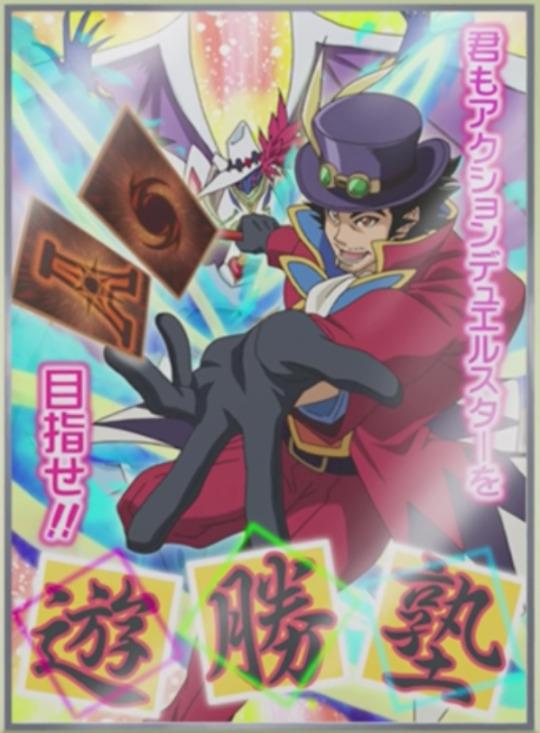
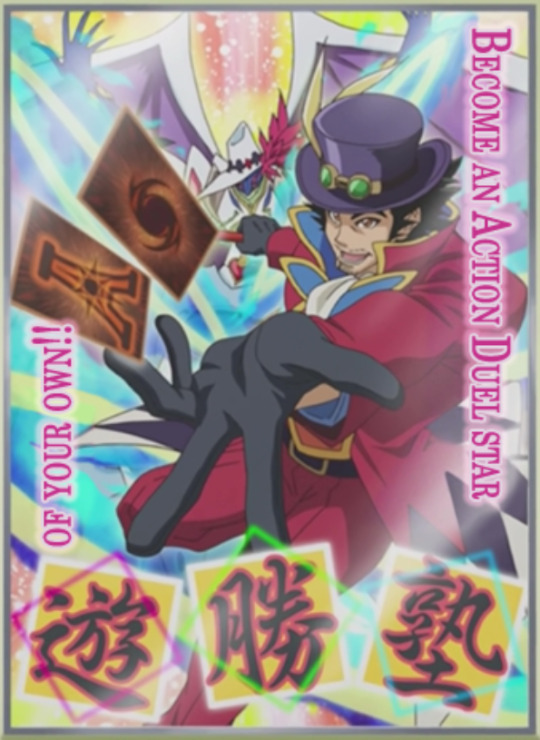
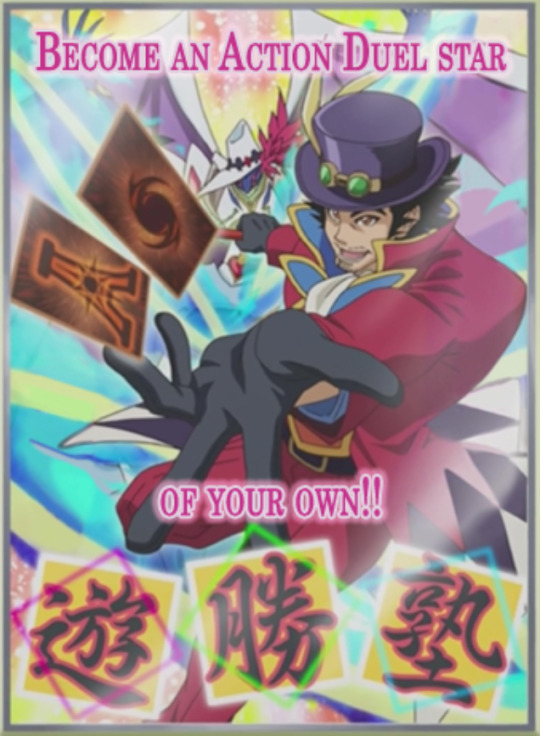
Also, always a bit amused when 4K misses a spot while blanking things like this lol


#arc v#yugioh arc v#arcv#yugioh#project rambling#this is for my 'dub-uncut' edit for ep 1 lol#worked off the 4K blanking edit and touched it up some then threw on the text#looking at it more i'm leaning towards 3 myself [i usually like to try and adapt the reading to an ENG audience but sometimes#i'll leave vertical text vertical like this (see my GX 'Just After This! The Best Card...' bits)#also was kinda clever of 4K to cover up the You Show Juku kanji with Action Cards#...even if that's the literal name of the You Show School but anyway#i feel like i wanted to take a crack at this when I thought I'd be subbing ARC-V but think i ultimately worked only on the Ishjima poster#that Nico brings out--which i just revamped thanks to having posted my english edit here so i didn't lose it with my '22 drive crash#but thought 'hey i'm working on this 'what if faithful localization' why not give it a try'#like I did with the 5D's dub-uncut project and that article Angela wrote on Yusei in the DS arc#[i waaanted to be a full madman and take a full crack at translating the duel school ads in the beginning but#not too many shots of some of the ones off in the distance throughout the Standard arc to really make them out lol#might still translate location names like the bank young Yuya cries in front of or their middle school name in a later ep]
11 notes
·
View notes
Note
snakes have something called a jacobson's organ that allows them to smell. they stick out their tongue, and then when it enters their mouth again, the jacobson's organ processes what they just smelled with their tongue. i say this to propose that, after yakumo licks eiden's dick for a good 10 minutes, he closes his mouth and processes it all like O_____O
when i TELL YOU that this message left me bracing the wall like
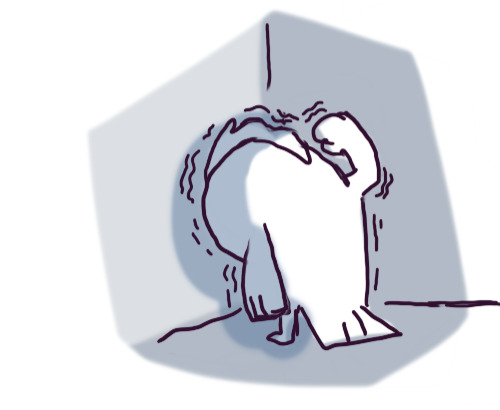
(overwhelmed with positive affect)
#you just... waltz into my inbox... LEAVE ME SNAKE FACT.... and HILARIOUS vision???#you do this freely? you would demonstrate such audacity???#i post my snorn and soon after i get a fun little inbox surprise#i was overcome with such gratitude that i had to consult my uhhjacobson's organ for a bit? 😂#thank u.... for showing up and dropping these words on me... *wipes joyous tear*#i immediately thought of those silly cat zoomies eyes#what? is yakumo gonna go comically BIG PUPIL after he's processed what just transpired?#(sucked eiden's dick for a full 10 minutes)?#or is he just gonna have a steam meltdown like in puzzling invitation#just straight up blue screen (Buffering....) for a minute while all the senses catch up to him#and eiden (if he manages to drift out of his ducked-out-brain) starts to worry#as soon as i read ur message i was ON WIKIPEDIA like the buttered side of the toast on floor#vomeronasal organ my vestigial intrigue...? according to this here article... humans have them but they don't do anything anymore#so maybe yakumo has a standard nasal system when in human form. he doesn't need to consult the organ for processing#but the moment he starts shapeshifting... once he reaches those in-between and beyond snakey forms...#he'll have to engage in the ol' lick-n-sniff.#and that's when the comedy kicks in#does he descend upon the dick with renewed hunger after all that processing? a bit of gluttony activation?#or does he ease up a bit because it's all too overstimulating?#UGH WHY HTWRIUELOW WHYUIAO. SDTP YOYU I'M A CHANGED MAN AFTER NAKED APRON YAKUMO#i'mma need twelve more orders of this please *gestures to the yakuei dick sucking*#feesh answer
26 notes
·
View notes
Text
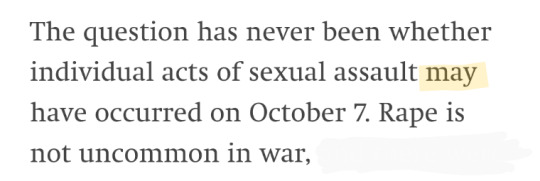
rape is just a thing that may happen during war. we're not saying it didn't happen. it may have occurred. rape is not uncommon in war. it's not a weapon of war, there's no proof it's a pattern of violence against women, it's just something that happens for some reason.
#rape tw#i swear i'm now done talking about this fucking article now that i've worked myself up and can't sleep#completely disingenuous dripping with smugness and written by three fucking males#and some of you gobbled this right up#which is the part i'm most angry abt even though i shouldn't be bc i know radblr is full of ideologues#and i know i'm guilty of buying into twitter threads without reading the article#but it should really really really not be hard not to dismiss rape claims#if your first thought is ''oh phew i was worried i would have to condemn my side's actions'' then you have also bought into a narrative#ironically just as this article claims#but i shouldn't be surprised bc i see blatant antisemitic rhetoric disguised as anti-zionism here on the reg#so why not handwave rape as well#i just hate dogma. i hate dogma that creates acceptable victims.#i'm not going to leap to the defense of radicalized + militarized males. idc who they are.#bc it's all of them
52 notes
·
View notes
Note
Sorry what’s up w the Ethan slater stuff? I know him only from your posts / SpongeBob stuff
HI HELLO please buckle in
yep -- the same guy from the spongebob musical, and my posts abut the spongebob musical.
he blew up completely and now the general public knows him as 'ariana grande's new boyfriend' - their relationship seems to have started off the back of co-starring in the upcoming wicked musical film adaptation.
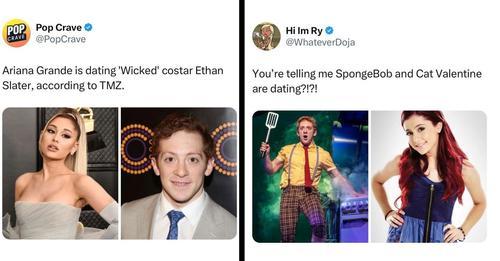
it's just been like. a monkey's paw curling sort of a way for him to get catapulted to fame, as i had always really enjoyed him as a performer (as spongebob, yes, but also in the other roles i'd seen him in,) and my biggest hope back around 2017 was that he would continue in and be really successful in theatre, get a lot of broadway roles, maybe take on some existing parts i thought he'd really suit, like seymour in little shop or ogie in waitress.......... but instead he booked the role of boq from wicked in a massive hollywood film production instead, where he met ariana grande. THE ariana grande.
and then yeah. at some point, he and grande broke up with their respective partners, (slater leaving both his wife AND newborn son) jumped into a new relationship, and now the whole wider internet knows who he is but certainly not for the right reasons.
there's been speculation regarding whether or not grande and slater had cheated on their previous partners before their relationship began with various sources coming out of the woodwork saying "yes they did" and others saying "no they didn't" -- humans are all perfectly capable of making stuff up, the media especially, so i simply don't know who to trust and i admit it had completely shattered my whole good impression of him - PLUS it gave the wider internet an absolutely awful first impression of him, resulting in, yeah, the (frankly, unflattering, sometimes downright cruel) memes of him popping up on twitter and, as i discovered yesterday, in non-theatre youtubers' videos who would literally never have heard of him if not for the slater-grande romance 🥲
FULL COVERAGE of the situation as it was happening can all be found on the lovely @notasimpleslater's blog under the tag 'ozgate' if you want to delve deeper!
#loren talks#ethan slater#months later let's call this my actual full response/reaction lol#i think at the time this was going down at the end of 2023 i was sort of just Freaking Out like my blood was boiling lol#i was parasocially furious with both of them#ofc now i do realise i'd put him on something of a pedestal#having seen his cute posts about his then wife an former childhood sweetheart plus posts welcoming his new son#AND having watched a youtube mini-series he'd made with his then-brother-in-law. i was SO invested and then.#i was like OH. he really DESTROYED his family huh.#but ofc! every situation is nuanced. we don't know what went on behind the scenes#wrg to his relationship. or what grande's was like with her ex-husband#since everything came to light there's been articles stating that slater wants to work with his ex-wife to share custody of their child#and that he's been spotted backstage WITH his son at spamalot on broadway (his current production)#so it sugggests he's not trying to be an Absent Father#which tracks with some of his own artwork as he and nick blaemire DID write a whole musical about the strained relationship between#a father and son and i just feel like. that suggests something about his personal character. and makes me HOPE he'd want to#be a present and loving parent regardless of circumstance.#anyways.#it's simply not my business BUT. seeing his face#popping up every now and again#it does just. feel extremely weird haha#there's a part of me that's like oh but that's musical spongebob my bestie what's he doing here#as for ariana i really have never had a strong opinion of her#but i have to say hearing her songs out and about these days...... :') i could do without it
30 notes
·
View notes
Text
LMSY interview! It's in Thai ofc but there are some great ppl on Twitter that are translating bits and pieces of it.
#here's hoping i one day understand thai and can come back and read this full interview lol#lmsy#interview#interviews#article#lookmheesonya#lookmhee punyapat#sonya saranphat#sonyalookmhee#affair gl#affair thailand#affair the series
10 notes
·
View notes
Text

L-R (top row) Miran Župančič, Primož Roglič, (bottom row) Klemen Bravec, Andraž Pograjc, ca. 1996:
The colours of the only ski jumping club from Zasavje were defended by Klemen Bravec from Trbovlje, Miran Župančič from Zagorje, one of the youngest ski jumpers in the competition at the age of six and a half, and Andraž Pograjc and Primož Roglič from Kisovec.
Cr: Tomaz Marzidovsek
#primož roglič#primoz roglic#without diacritics for those of you living in blissful idgafville must be nice to not be memorizing unicode#andraž pograjc#miran župančič#archiving#Who the fuck wrote this article andraž is two full years younger than miran. Or are all the translators failing me..#Im curious whats up bc Primož says he started at 8 and was playing soccer at the age hes supposed to be here#If you speak Slovene please hmu lmao#ski jumping#sloski#my post
15 notes
·
View notes
Text
"Why do Britain’s guitar heroes become household names – yet its piano and organ players don’t? Let’s end this injustice, writes Elton John, as he pays tribute to all those thrilling showmen eternally confined to the wings" "I realised incredible keyboard players were everywhere: not just Zoot Money but Georgie Fame, Brian Auger, Graham Bond, Rod Argent. They were all doing something different with the keyboards; each of them had their own personality. "
"Rod Argent was the engine room of the Zombies. He wrote She’s Not There and his playing takes it to another level. It’s very English-sounding, very reserved and melancholy, then out of nowhere he plays this incredible solo that’s soulful but slightly classically influenced. It both fits the song perfectly and takes it somewhere else." "We think of heavy rock as a guitarist’s art, but in Deep Purple, Jon Lord was experimenting with distortion to give the organ a sound as hard-driving as the guitars. So did Rod Argent when the Zombies broke up and he started Argent."
- Elton john
#elton john#rod argent#the zombies#argent#argent band#zoot money#georgie fame#brian auger#graham bond#deep purple#jon lord#the full article is in the link#but i just wanted these parts here where he mentioned rod
7 notes
·
View notes
Text
The songs of Young Royals - S2 E1
Here we go for season 2!! More songs so hopefully even more interesting stuff to analyze ^^
Brainfreeze, XVOTO
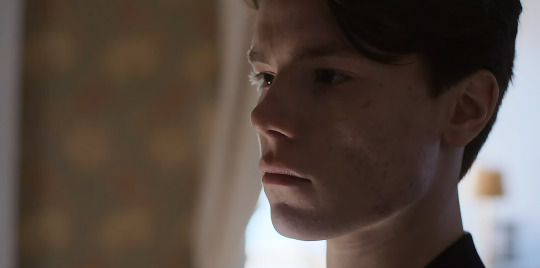
When I die ... All the voices in my head Tell them how it went and tell them not to miss me much ... Live forever ... Is it God that you see?
The song starts when Wilhelm is in Erik's room, while he burns the picture of his brother and August. It's fitting that the lyrics are partly about death, about telling people not to miss the dead person. Wilhelm misses Erik so much though. This is a good choice for a season that is going to be a lot about grieving. And the "Is it God that you see?" when we get to August sending messages to Wilhelm asking him to forgive him: yeah, will there be a redemption for you?
Aldrig igen, Omar Rudberg (Cherrie & Stormzy)
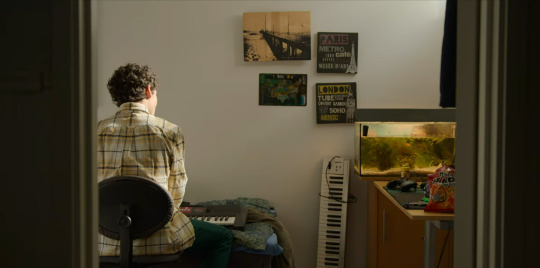
Being alone, I'm the strongest It's never happening again ... Because I don't wanna feel like this I don't wanna feel like this I don't wanna feel like this Who would wanna feel like this ... It won't happen again
So I discovered during this analysis that it is not a little snippet of a song that Simon created but the cover of an actual Swedish song ^^ He sings it while Marcus is listening in his back. The song reflects completely what Simon is feeling: the break up happened just before the Christmas break, so not that long ago, and he's still feeling so heartbroken. But he doesn't want to keep feeling that way, he doesn't want this painful situation to happen again (seems fateful that it is when Marcus enters the picture: Simon says it there, he will not fall in love and get his heart broken again, so too bad for you Marcus, but you will not get a love story here! Simon will say it himself later on in the season "why can't I fall in love with him?"). The entire song is actually super interesting lyrics-wise because it's about getting over a break up, feeling betrayed by someone who lied, and deciding that you actually deserve better. "Please stop stressing me, I need to breathe... First you wanna leave, now you wanna stay?": it's really about an ex who doesn't know what he wants and keeps changing his mind, changing the rules. Which is what Wilhelm is kinda doing (saying it's not him in the video to the world but then coming to Simon to ask to keep things going, and the the whole beginning of this season where he's gonna try to get Simon's back even though his situation hasn't changed). So yeah these 2 first songs of the season are really fitting to both characters and a very good idea of what the season is gonna be about : angry and grieving Wilhelm vs heartbroken, betrayed (but trying to find his boundaries) Simon
Bang, Cat Clark & Mega
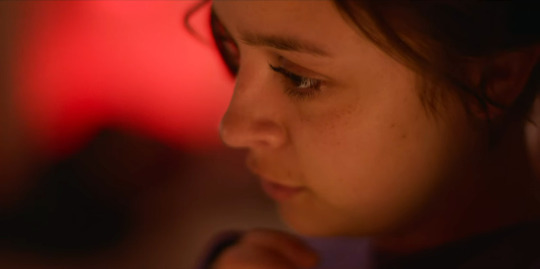
We ain't never stepping down ... I'ma run laps round all you rats
Pretty fitting for Sara finally entering the privileged life of Hillerska. With all these students from rich family who will never "step down", who will keep the status quo, keep looking down on people who are not from their world.
Ripe, Flavia
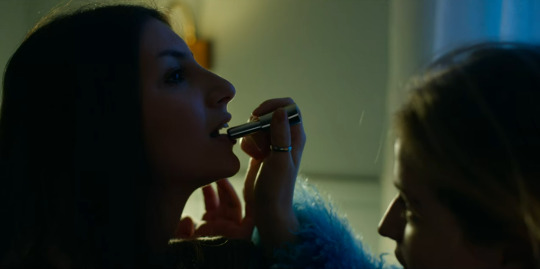
No need to go to work unless I'm working on your body Hold you up, lay you down, staying up 'til the morning Working hard in the sheets, we could stay here for a week No need to go to work 'less I'm working on your body
A song with very suggestive lyrics, which less very little to the imagination about what the students are gonna get up to at this party ^^' "Ripe for the picking even when I'm not in season": can we also talk about Sara getting her initiation and being thrown into this classist privileged Hillerska life while still being an outsider? There lyrics feel like some kind of metaphor for her wanting so badly to be integrated, to feel ready for that. Or to think she's ready for that, while the reality might not be the same.
Love isn't love, Carola
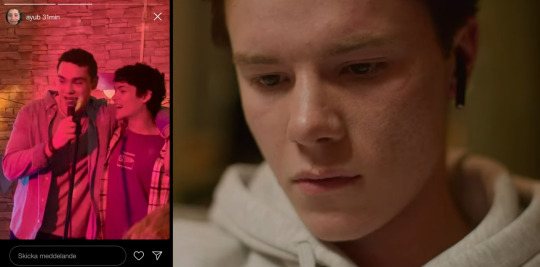
Stranger, you came into my life Touched me with sweet sensation ... And stranger, you cut me like a knife ... It isn't right It isn't real at all It's just illusion A dream that will tumble and fall
The infamous karaoke "date". I like that the first sentences are sung by Marcus, because yes he got immediately interested in Simon after meeting him. But then he passes the mic to Simon who has to sing "cut me like a knife" and, he doesn't know it yet, but Marcus is quite toxic in the end. He is not gonna treat him well at all, not gonna respect him and his boundaries. Their "relationship" is not gonna help him or heal him at all, it's just gonna hurt him. And we cannot ignore the very (NOT) subtle lyrics when Wilhelm watches the Insta story of them singing: "it's not real". Because it's not. It's not a date. It's not love. It's nothing. And yeah, he's gonna be under the "illusion" of them being together and happy, but it's nothing more than that, an illusion. (And special mention to Wilhelm going feral and threatening the whole monarchy because his ex-boyfriend is on a date: Wilhelm baby, I love you so much!)
Seize the power, Yonaka
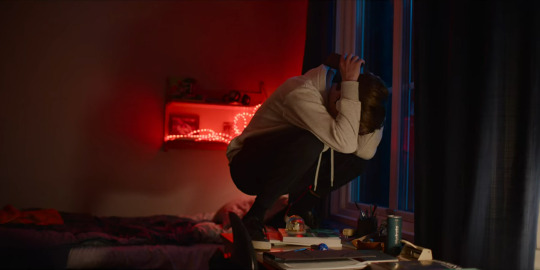
Woke up this morning I feel so fucking important I look in the mirror I'm different I finally made a decision ... They hurt you and make you feel helpless They're not brave like you They're too scared to do Anything that's different Anything that's new I don't need lessons I do what I want it's refreshing ... Hey there how you've been? I'm the voice in your head And I know you've been aching When you find me let me in I got power in my hands and it's yours for the taking
So this song is for the end credits of the episode but it's an amazing one and so important! We just saw Wilhelm yell at his mother and threaten the Courts because he doesn't want to be Crown Prince, doesn't want the responsibilities, doesn't want to be a puppet to them, doesn't want to sacrifice Simon and their relationship. And the first lyrics feel fitting: he's mad (and the lights in this bedroom are red and twisty: what better image to represent the rage coiling inside of him at this moment?), he "woke up" after being faced with the reality of the consequences of his lying about the sex tape. With the reality that Simon is on a date with someone else. And gosh yeah, these people, your own mother, they hurt you so badly and made you feel helpless. Making you follow their orders with not agency of your own. But you're gonna be so brave, and different, and strong! I love the chorus "I'm the voice in your head" because he's angry and screaming and threatening but nothing is very effective in the end (we'll see that next episode). He doesn't seem to have power yet. But if he listens to the little voice inside, if he takes the time to do that (and he will! Thanks to Boris for helping him doing some introspection and realizing things), he will realize that the power is here, deep inside him. That the strenght to do what's right for him, for Simon, well he has it. He just needs to close his eyes, reach inside and "take it"
The songs of Young Royals - part 1 The songs of Young Royals - part 2 The songs of Young Royals - part 3 The songs of Young Royals - part 4
#Young Royals#Young Royals analysis#Young Royals songs#Young Royals S2E1#Prince Wilhelm#Simon Eriksson#my analysis#song analysis#and here we go for season 2!!#this first article is quite long#there are a lot of songs#(should I make 2 articles in this case? I don't want it to be too indigest to read ^^)#Seize the power#is one of my favorite discovery thanks to the show#I love love love this song#it feels so full of rage and power#feels very very Wilhelm#I listen to it a lot ^^
24 notes
·
View notes
Text
oh i've been trying to find this interview again, which i remembered mainly for the parts about [interviewing the parents which is so Interviewing The Parents] but has many fun details
The first time Will Roland auditioned for “Be More Chill,” he didn’t get the part. “It’s the reality of our business,” says the actor, whose family moved from Manhattan to Locust Valley when he was 8. “On any given day . . . you may be the person who is going to get the job and you may not be.” But let’s not feel too bad for Roland, whose theatrical trajectory is the stuff most people only dream of. At the same time he was auditioning for “Chill,” the sci-fi musical that made it to Broadway after its cast album went viral (more on that later), he was also involved with a workshop for, as he puts it, “another little show called ‘Dear Evan Hansen’.” He got cast in that show, playing Evan’s friend, Jared, a character who brings comic relief to a work that has its devastating moments. Roland looks back on his four years with the show as “an absolutely incredible experience.” The writers worked “my sense of humor, and the sardonic way I observe things” into this classic theater role of the clown, “the one who comes out and observes the ridiculousness of the situation,” says Roland, sitting in the balcony of the Lyceum Theatre where he’s rehearsing his next big Broadway gig — the lead in “Be More Chill,” which opens March 10. Obviously, everything turned out just fine for Roland, and for “Be More Chill,” a pop-rock musical based on a 2004 young adult sci-fi novel by Ned Vizzini that appeared to be dead in the water until the cast album went viral on social media. After the show played at a small theater in Red Bank, New Jersey, in 2015, “I thought it was going to be the next big thing,” says Joe Iconis, the Garden City native who wrote the music and lyrics. “There was so much momentum.” But after a review in The New York Times that “was not particularly helpful,” interest dwindled and Iconis and his partners moved on. Happily, some things are meant to be. The Red Bank theater had enough faith in the musical to order a cast album, and suddenly the fan base exploded, videos were all over YouTube and fan art appeared on Tumblr. That led to an Off-Broadway production last summer that sold out before performances started, and eventually to the Broadway run, with Roland, who is part of Iconis’ extended theatrical family, very much back in the picture.
Real people, real issues The young star was decidedly upbeat on Valentine’s Day, the afternoon following the first preview when he says those extremely vocal fans “brought some hard-core joy into this building.” Like everyone involved, he’s intrigued by the way the show took off, but really, he points out, it’s nothing more than word-of-mouth, which “just happens to be the internet right now.” On the other hand, he says, “I don’t know that word-of-mouth has ever put so much wind into the sails of a production.” When asked why the show resonates so strongly with fans, Roland says what they love about the show “is the same thing that I love about the show . . . that it is an honest depiction of real people dealing with real issues.” Roland plays Jeremy, a nerdy high schooler who never fits in until he swallows a SQUIP (a quantum computer in pill form) that has the power to turn him into one of the cool kids. There’s significant fantasy at play, says Roland, but “there is truth to every one of these characters . . . it doesn’t speak in broad, heart-rending poetry, it speaks in really human language.” Does he see himself in the character? “I think he sees himself in me a little bit,” jokes Roland, who talks about first getting involved with theater at Friends Academy in Locust Valley, which he attended from sixth grade through high school. “What they created for me, first and foremost, was a space where I found community and acceptance and belonging,” he says, which he notes, is why a lot of people start doing theater. Roland was serious about his goals “from the moment I met him,” says Tracey Foster, director of arts at Friends. “He knew what he wanted to do in life.” As the title character in “Oliver!” one of his first major roles at the school, Foster says that beyond his “big, booming, beautiful voice,” he was “touching, tender and scrappy.” (Roland’s recollection differs: “My voice was changing so it sounded really bad,” though he acknowledges that he’s “channeling a lot of those days in this performance.”) From the beginning, Foster says, Roland displayed “a wonderful combination of confidence and humility that . . . let him make mistakes and keep moving forward, pick himself up when he needed to.” Those qualities, she notes, suggest that “he’ll be able to survive the bumps in the industry.” Foster was in the audience for the first preview and naturally thought Roland was “spectacular.” But she also has raves for the production, which she first saw Off-Broadway. “They grew it up for Broadway,” she says, “in a way that was beautiful and fulfilling.”
Acting in his soul Roland’s family, of course, saw his raw talent early on. “Will sang before he spoke,” says his mom, Beth Roland, explaining that since she was a fan of “putting my child in front of a TV,” the first words out of his mouth were Big Bird’s alphabet song. Now, she says, “acting is just in him . . . it’s in his soul. I think he acts in his real life.” His dad, Bill Roland, who gets endearingly emotional when talking about watching his son onstage, has a simple response when asked about Will’s success. “Passion,” he says. For now, Roland, who turns 30 on Tuesday, is thinking less about the past than about opening night, managing the inevitable changes that Iconis and book writer Joe Tracz are throwing at the cast. He is getting married next year (check out Instagram for photos of his proposal at the ritzy but rustic Blue Hill at Stone Barns in Tarrytown). After that, who knows? “Be More Chill” could run for years, and there’s a movie in the works. No one’s called yet, but Roland says, “I would very much like to be involved.” Wisely, Roland is not thinking too far ahead. “I love doing TV and film, new plays, new movies,” he says, “really getting to put my stink into a character.” He looks forward to the day he can call his own shots and thinks at some point directing might be an option. “My dream role,” he says, admitting that he’s borrowing the thought from others, “hasn’t been written yet.”
Behind the music and lyrics “When I wrote ‘Michael in the Bathroom,’ I was writing about myself,” says Joe Iconis, the Garden City native who wrote the music and lyrics for “Be More Chill.” If you don’t have a teenager in the house, note that the runaway hit from the show has all but broken the internet (it has its own Instagram account with, at last look, more than 12,000 posts). Iconis says when he wrote the song, about a guy who locks himself in a bathroom rather than face the other kids at a Halloween party run amok, he was writing about his adult self. But, he adds, “I hoped that young people would relate to it because it is a universal thing . . . someone else is going through this, not just the character in the show.” The success of the song and the show is part of a growing Iconis moment in New York theater right now. His musical “Broadway Bounty Hunter” will get its New York City debut this summer starring Annie Golden, and the cabaret group known as Joe Iconis & Family is set for a run in April and May at Feinstein’s / 54 Below. Sitting in a balcony lobby at the Lyceum Theatre, where “Be More Chill” is in previews, Iconis talks about getting the theater bug at 6, when his dad took him to see “Little Shop of Horrors” for his birthday. “I was immediately hooked,” he says, but as he grew older he realized performing was not for him. “I was terribly scared to be on stage.” With the support of his nontheatrical family (his dad is in information technology, his mom is superintendent of the Massapequa School District), the self-described “theater nerd” focused on music and says he knew by sixth grade that he wanted to be a Broadway composer. “I was definitely the only child who could say that. Ever.” As he works toward opening night on March 10, Iconis is focusing on fine-tuning the piece (“musical changes, script changes, things we want to tighten, numbers we want to reorder and rearrange”). It’s a huge enterprise, he says, but his faith in the show grows by the minute. He calls it “the little show that could.”
#try finding any interview or writeup about anything ft. will's family that doesn't have a note about how & they are so so proud of him#about how endearing that is &/or what great laughs people have & etc#the one worded yet genuine dad answer while your mom is speculating to the interviewer about your irl dramaturgy lmao....#AND we interview your middle / high school theatre Director Of Arts lol. & them being at that first preview like aw yay#is this written for like an audience of average age assumed 75? maybe. them saying ''young star'' like....will??#like yeah all of a month out from thirty but using that phrase i'd expect like. early twenties at the latest. more so an actual teen#just humorous....as are things like ''that was not particularly helpful'' lmao#the sesame street abcdefghi song lore is such a detail too. what trivia. what fun First Words#bmc#will roland#joe iconis#full text of the article here; the Formatting Breaks are from me driving back tumblr's block character limit with a large stick
4 notes
·
View notes
Note
Answering your tags in the children’s rights post, no, not where I attended school (US public school). I wasn’t even aware the UN made a document about it until now, which is unsurprising for the US but nonetheless aggravating
every day I learn something more horrifying about the US education system.
I'm pretty sure we read the children's rights when I was in grade 5 here in Australia? so I would've been 8 or 9 or so. I have no idea if this was standardised so really idk what I'm surprised about. but man that was something that built a foundation of autonomy for me as a kid that I could fall back on when I was scared... I have the right to safety. I have the right to xyz. seems important I think.
#recently learned from my american bfs that neither of them got in depth persuasive writing education#in their english classes at school or whatever#meanwhile thats a MAJOR and EXHAUSTIVE part of the curriculum here#and suddenly I'm understanding why the internet is full of americans with no ability to formulate an argument#it literally wasn't taught to you!!!!!!!!!!!!#that's fucking scary#when i say a major part of the curriculum here#i mean we were writing persuasive essays every year from year 7 onwards at the EARLIEST#we were analysing advertising and articles and media for persuasive techniques#persuasive analysis and essay writing was part of our final exams#such a backbone foundational part of the english curriculum here i cannot fathom what school is like without it#this is How i learned to write an essay. in persuasive format#that's an aside from the child rights thing but like#idk it's genuinely scary to me lmfao#what do you mean they didnt teach you persuasive writing. it explains a lot but what do you mean.#the system speaks#anon
6 notes
·
View notes
Text
i need to put in applications but before i do that i need to calm tf down cuz i just saw something chris related that is making me insane
#i'll have to read the full article later but oh baby. shields when i get you shields#i have some other stuff i have to look at/answer on here too but i need to do job application before i do any of that#and i mean it this time and i'll be holding myself to that#but first i need to calm down i feel CRAZY.#marshy speaks
3 notes
·
View notes
Text
I already told this particular opinion before but gonna post it here too.
Terrible chemzee opinion 2636
If we look at it from Cassandra's perspective, I believe she was mostly absolutely justified in Y1. Because if some random girl tried to make me dissapear/seriously hurt/kill me (the way it looked like from her perspective) but failed I'd also do a background check on her too 🤨 like girl what if she already hurt someone before? Plus, Cass wanting Ivy to get expelled? DUH she though Ivy almost killed her! Plus she learned she allegedly wasn't the first one so she's even more justified.
#I remember that one part in Y1 C5 where she says “I didn't show that article so you'd jelp her”#like she may have sounded condescending but I do think that was the actual intent#to give mc and daniel receiptes they need to avoid Ivy (rightfully so FROM HER perspective)#like girl doesn't know Ivy lore™ in full details#as much as I know Cass is supposed to be our rival AND she wasn't justified in bullying Daniel#she really was villainized here but cmon. she was pretty much right 💀#ofc thank god Ivy was actually innocent and didn't actually mske her suster dissapear but still#Cass had all the right in the world to not trust her/go background check on her#BTW IMPORTANT you don't have to agree with me and I think that if you do disagree you can share your thoughts 👁👁#hpma cassandra#hpma ivy#magic awakened#chemzee rambles lmao#silly opinions#cassandra vole
26 notes
·
View notes